Policy Advocacy in Action: Reflecting on the Alumni Leads Program
Two Alumni Advocacy Leads recap their year of food policy advocacy.
Join our corps! Applications for 2026-2027 are now open. Apply by March 30.
Two Alumni Advocacy Leads recap their year of food policy advocacy.
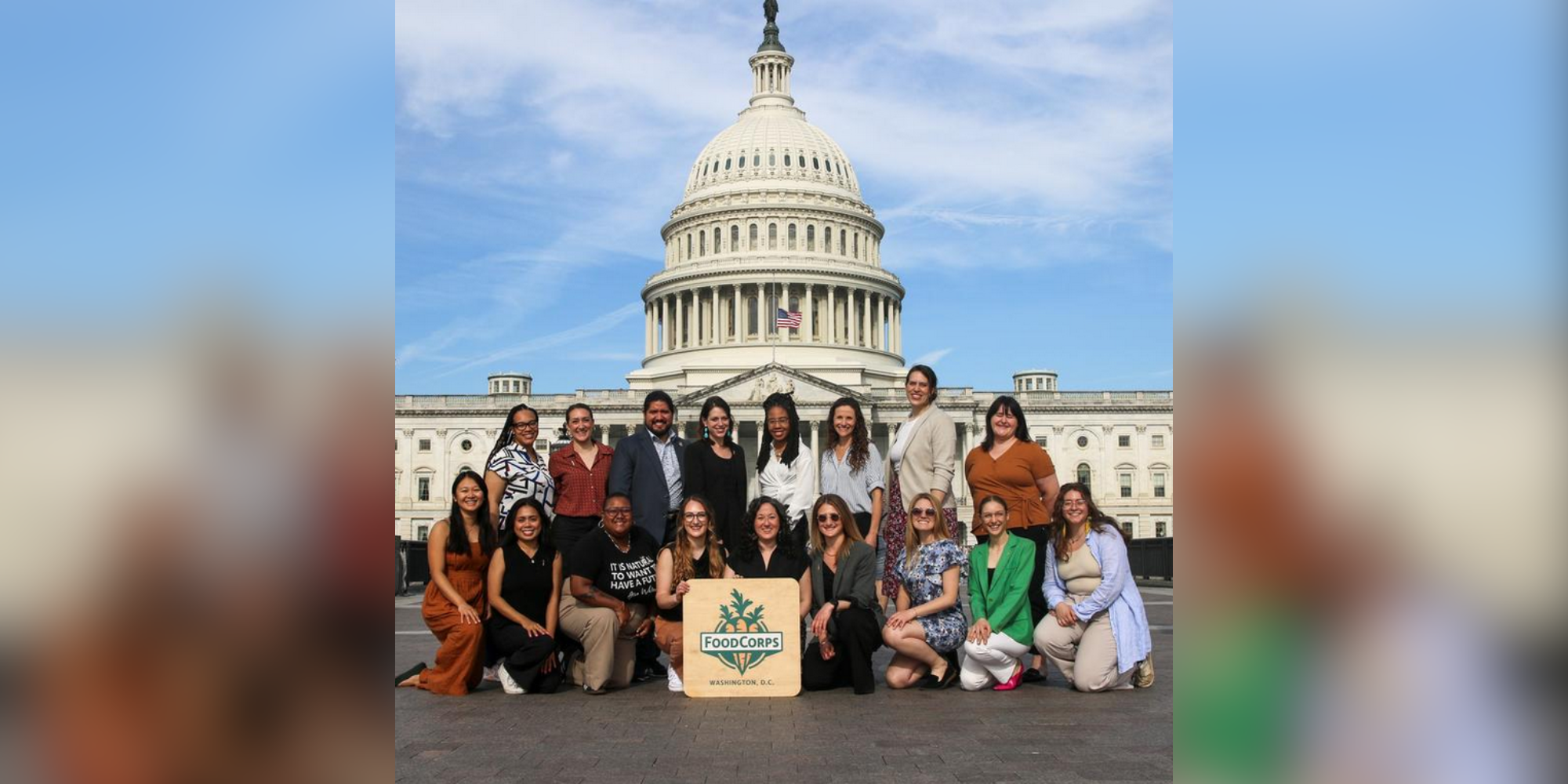
This post was written by two of FoodCorps’ Alumni Advocacy Leads for the 2023-2024 school year. Read on to learn how these alumni spent the year channeling their skills toward policy advocacy efforts for nourishing food in schools.
Each school year, FoodCorps recruits the next generation of leaders from the spaces of nutrition, education, and agriculture to provide capacity building to public schools as AmeriCorps members. These members are placed in school sites across the nation to help the school and community efforts in addressing food education and school meals. FoodCorps members gain invaluable experience at their sites, leaving the sites in the good hands of communities after having helped develop and implement projects and having gained professional development.
Now, FoodCorps offers an exciting opportunity for corps member alumni to participate in policy advocacy as FoodCorps Alumni Advocacy Leads. Appointment in these roles allows members of the Alumni Advocacy Lead cohort to “play a meaningful role in supporting FoodCorps’ advocacy engagement.”
In the 2023-2024 school year, FoodCorps selected 17 alumni from 16 different states across the country to advocate at the state level, supporting FoodCorps’ 2030 goal: that all kids have access to food education and nourishing, free meals in school.
FoodCorps Alumni Advocacy Leads joined in virtual training over the course of nine months, all leading to a gathering in Washington, D.C., in May. With the support and guidance of FoodCorps staff, the Alumni Advocacy Leads gained a better understanding of what policy advocacy looks like and gained experience as active participants in policy advocacy.
Policy advocacy simply means being active in support of certain public policies. In relation to the FoodCorps Alumni Leads program, the members of the most recent cohort participated by creating dialogues with decision-making leaders from their home states. When their legislators were not available, some of the leads were able to have engaging conversations with staff members of those offices, circulating their messages.
Policy advocacy can look different if one is engaging as an individual with a strong opinion about a public policy or if one is representing a bigger entity, as our Alumni Leads were representing FoodCorps and FoodCorps’ 2030 goal.
Other ways that one could participate in policy advocacy may include making phone calls or writing emails to the decision makers in their states and local governments. It’s helpful to share one’s personal stories or statistics that could help urge decision makers that there are good reasons that they should take action on behalf of their constituents. Oftentimes, you may be engaging in public policy advocacy simply by sharing a meme on social media about a policy that you agree or disagree with!
“Many Americans feel disconnected and without a voice because advocacy is made to seem inaccessible to the majority. But at the end of the day our voices are simply all we have to change our world.” — Former Alumni Advocacy Lead
Hungry for more ways to take a bite out of policy? Check out the Policy Action Menu drawn by FoodCorps Alumni Leads shared below!
To conclude the program, Alumni Advocacy Leads were invited to gather in D.C. as a way to connect with each other, as a call to action, and to celebrate our advocacy. Over the course of three days, the Alumni Leads from across the country met with FoodCorps staff for professional development opportunities, prepared for meetings with state legislators to advocate for different policy priorities, and, of course, enjoyed delicious food together! Prior to meeting in person, each Alumni Lead reached out to the offices of their respective state legislators to schedule meetings during their time on the Hill.
To prepare for these meetings, the Alumni Leads learned how to share personal and professional stories as well as what to expect during the meetings. They also had the opportunity to meet with current Arizona State University students in the Sustainable Food Systems program, including some FoodCorps alumni, to network and learn more about that program.
Tara: I had meetings with the legislative staff from Senator John Boozman’s office, the office of Senator Tom Cotton, and with Congressman Steve Womack’s office. It was a busy day!
In each office, I talked about how integral food education is for young students and advocated for school meals for all. It surprised me that all three of the offices were enthusiastic about the Farm to School and Early Childhood Education Program. According to the Arkansas Department of Agriculture, Farm to School is a program that “connects schools, local growers, and the community to food and farm education experiences paired with healthy, locally grown food.” After each conversation, I was able to connect the staff in each office with the FoodCorps Arkansas team so that they may plan to visit school gardens for themselves.
Sophie: I met with legislative staff from Senator Joni Ernst and Senator Chuck Grassley’s office. I was incredibly nervous going into the meetings, as I wasn’t sure what to expect and didn’t feel like I “knew enough.” That wasn’t the case at all. The staff I met with were very easy to engage with and I felt listened to! Since I work at a nonprofit managing local food grants, I focused on local food in schools.
Iowa has had a Local Food for Schools grant for the past few years that is ending in December 2024. I highlighted the impact this program has had on students and school nutrition directors across the state. FoodCorps staff provided us with informational one-pagers related to school nutrition, access to school meals, and local food in schools that I left with the staffers. I was able to connect with one of them as someone from the midwest where agriculture is abundant, but not talked about much in schools. Overall, it was not as intimidating as I pictured and I felt so empowered after!
While in D.C., we had a full day of training before we went to advocate with our state legislators. Our leads created charts to better flesh out what policy advocacy looks like and how each person can be an advocate. The Policy Advocacy Menu is a palatable breakdown of different ways to be an engaged advocate. The menu includes “digestible” ways to be active: some are less time-consuming and remote, and others take a bit more energy and time, or may require being present in person to advocate.
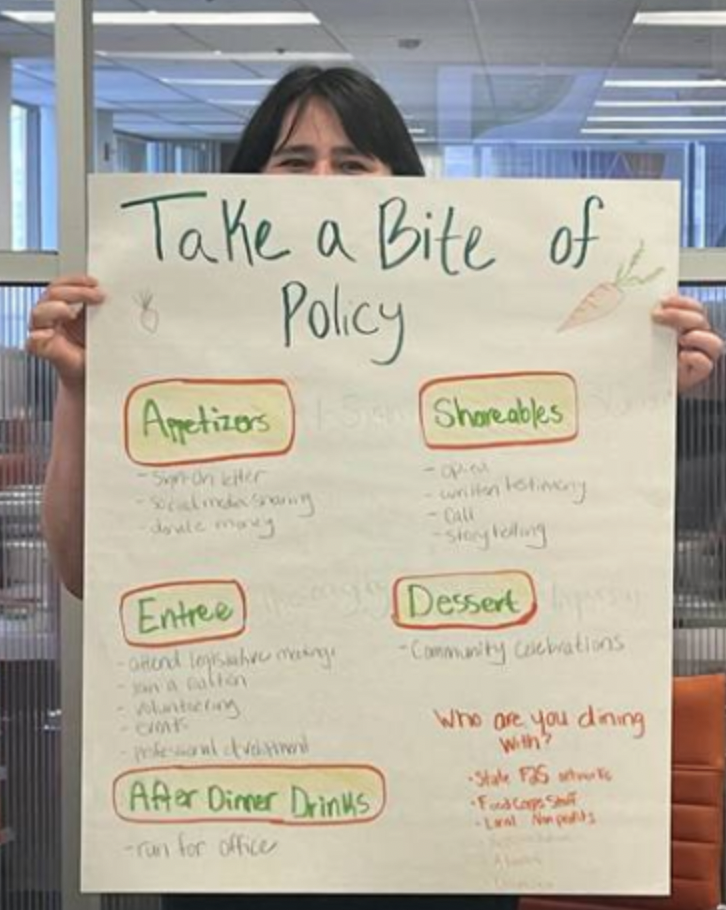
A big takeaway for each person was that at the end of the day, legislators in office are just people like each of us. Everyday citizens may not be key advisors to decision makers, yet it is still relevant to reach out and share your message, especially when it is coming from a place of your personal experiences. Yours just might be the insight that they never would have been exposed to without you having started that dialogue!
“I learned how relatively easy it is to engage with our representatives and how receptive their staff can be to our voices.” — Former Alumni Advocacy Lead
Tara: Before the D.C. gathering, I was active as a volunteer. In some of those activities, I participated in writing to legislators or posting about policies.
During our day of training in D.C., Nathan Medina, FoodCorps’ Director of State Advocacy, told us all: “You were meant to be here.” I took that to heart. I believe what he meant was that we all have a distinct voice and it’s important for your state representatives to hear it. I’m still involved in volunteer activities today, yet I feel more empowered than ever to be civically engaged as a citizen with unique experiences and a vested interest in what happens in my state as well as our country.
Upon returning from the D.C. gathering, I have been more active than ever locally in Fort Smith, Arkansas. For one, I attend more local meetings held by my city’s Board of Directors. Sometimes I just go and listen to the issues at hand, trying to learn more about the issues that the city’s board is voting on. Other times, I feel strongly about the issue, and will either write to the board members or get up to speak to our city’s board at meetings.
“The firsthand experience getting a constituent’s message to a legislator; I feel like my voice is more powerful than I knew before.” — Former Alumni Advocacy Lead
Sophie: I only had a little experience with policy before my time as an Alumni Advocacy Lead. It has been something in my periphery, but I felt too intimidated and overwhelmed to jump into it fully. I am so grateful that I decided to apply and was accepted for this position. The preparation leading up to our D.C. gathering reiterated the fact that policy advocacy can look so many different ways, even in ways that I had been participating in without realizing it was advocacy. Meeting all the other Leads in D.C. and hearing about their work was truly inspirational and we connected through our experiences.
Personally, it was empowering for me to advocate directly through meeting with legislative staff in D.C., making the most out of being a Lead for the past nine months. It was a big hurdle for me to get over, but I am so glad that I pushed myself out of my comfort zone to advocate for something that I feel very strongly about and deal with every day through my job: food education and local food in schools. Since returning from D.C., I have looked for ways to be more active in policy work, including some of the ways we talked about when creating our Policy Menu!
We’re glad you asked! Here are some ways to get involved in food policy advocacy.
Finally, subscribe to policy advocacy updates from FoodCorps! We hope you’re as inspired as we are.
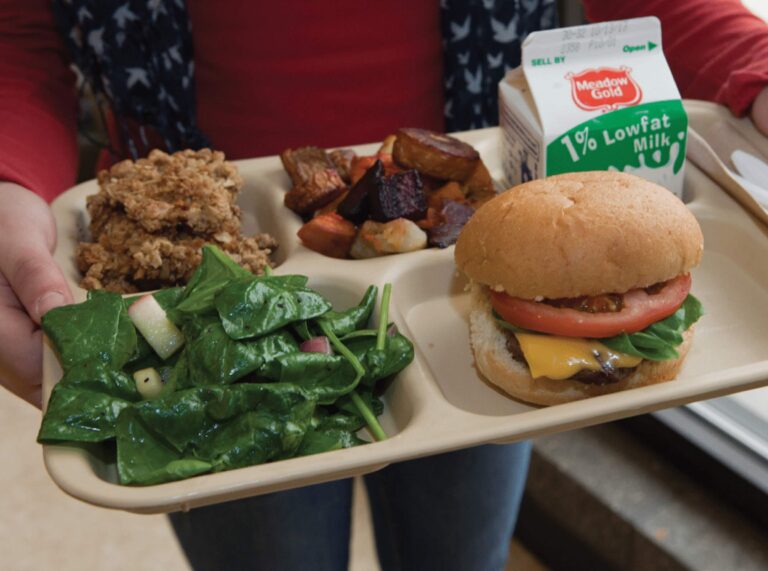
3 Reasons We Need School Meals for All
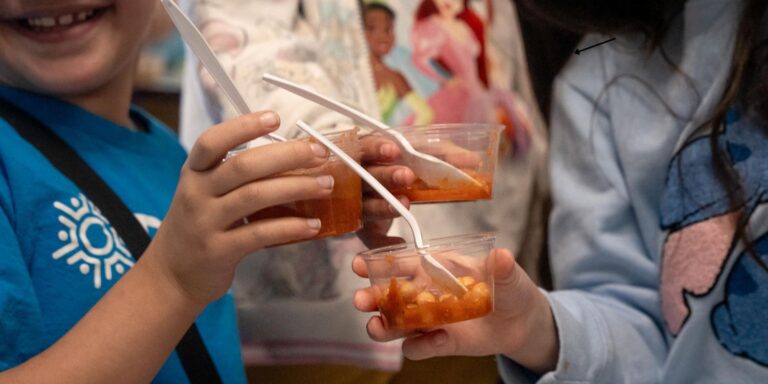
Mindful Tasting: Eating with All 5 Senses
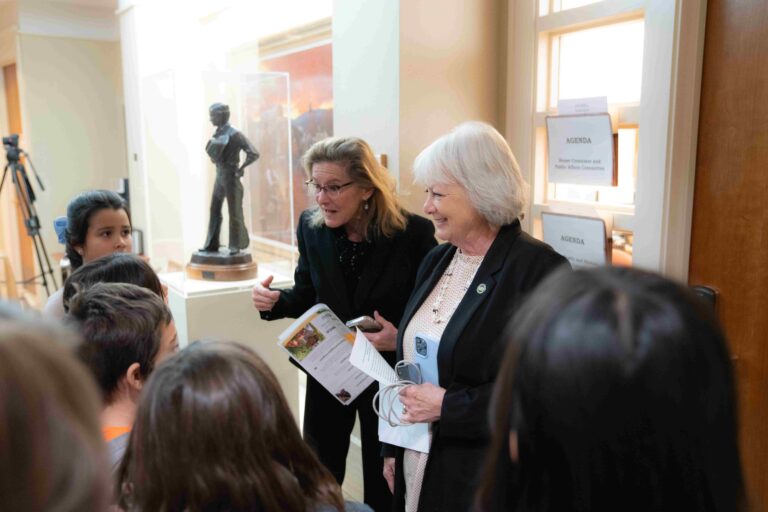
Our 2025 Child Nutrition Policy Year in Review